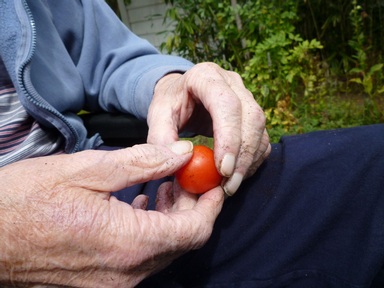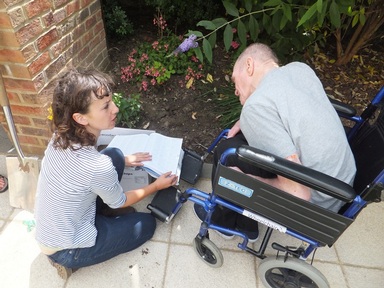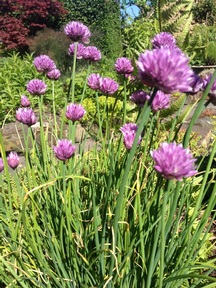Therapeutic gardening boosts wellbeing in care homes
Many care home residents rarely or never go outside, yet it is well known that being outdoors in the fresh air and sunlight among plants and trees is hugely beneficial.

In a bid to improve the wellbeing of people living in care homes, Dale Cranshaw and Victoria Hill founded Growing Support, a therapeutic gardening project based in the South West of England.
The initiative has only been going for two years, yet it has already worked with over 20 care homes in Bristol and Somerset and seen the demeanour and attitudes of residents change.
The pair set up the project because of their personal experiences. “Dale had been to see his grandmother who had Alzheimer’s and was in a care home and he found she wasn’t going outside at all.
“I had a great aunt in a care home and I had also volunteered in that care home when I was younger. The activity room just had some jigsaw puzzles in with some of the pieces missing. The only thing that had changed 25 years later when I went to visit my great aunt was they had put a flat screen TV in there.
“Dale decided to give up his job to learn the skills we needed to help people spend more time outdoors. He spent 18 months volunteering on care farms and community gardens and took a Diploma in Social and Therapeutic Horticulture at Coventry University,” says Victoria Hill.
She has found that gardening can have a huge positive impact on older people’s wellbeing as well as people with disabilities.
Fine and gross motor skills
“Gardening gives people the opportunity to use their fine motor skills which are vital for keeping their independence as fine motor skills are needed for doing up your buttons or feeding yourself.
 “It also provides the opportunity to exercise gross motor skills which are important for strength and balance and help prevent falls. Going outdoors is very important for sensory stimulation. People with severe disabilities may not be able to participate actively any more but they can still hold the earth and feel the texture and smell the herbs and flowers.
“It also provides the opportunity to exercise gross motor skills which are important for strength and balance and help prevent falls. Going outdoors is very important for sensory stimulation. People with severe disabilities may not be able to participate actively any more but they can still hold the earth and feel the texture and smell the herbs and flowers.
“A lot of people who live in care homes are still physically very strong but people with dementia may need some help remembering how to do some gardening tasks. The volunteers work alongside them to help break down the task into manageable chunks.”
Ms Hill has seen huge changes in some care home residents due to their therapeutic gardening sessions. At one care home, a resident called Doreen was very agitated and upset when she arrived at the gardening club.
“Staff told us that she had been ‘inconsolable all day, no matter what we try’. Initially, a volunteer walked around the garden with her and they chatted until she became calmer, a horticultural therapist then worked alongside her and they planted flowers together. After an hour Doreen was interacting with the rest of the group, laughing and contributing to the group activity. Care staff were amazed to see the change in her.”
Community gardens
Growing Support has recently started some community gardens where people living with dementia and their carer can come and do gardening. The Growing Support team hope that care home residents will be able to visit the community gardens so they can experience being in a different environment.
“In general most care homes want to do the best they can for their residents. What is challenging for care homes particularly the ones that take a lot of local authority-funded residents is that they often don’t have the resources to put on a lot of activities.

“However all care homes have a garden or other form of outdoor space and we provide activity sessions they can slot into everyday life and make the best use of existing resources.
“I am very sympathetic to care home staff as they have such a lot of tasks to do and it doesn’t leave much time for interaction with the residents.”
Gardening can be tailored to the individual depending on how active they are. If they are fairly active, they can get involved in potting, digging, pruning and harvesting produce.
However it is even beneficial to less active residents who can watch and enjoy others being active and feel the sunshine on their faces. Natural daylight is good for helping residents to regulate their body clock and to sleep at night.
“Our approach recognises that care homes are trying to do their best to address this but often have limited resources. We provide the skills, tools and resources to help them make best use of the resources they already have,” says Ms Hill.
Training care workers
As well as running sessions, Growing Support trains care workers to run the gardening sessions themselves so the residents can garden more regularly. “A lot of people don’t actually know how to garden and so care staff may not be confident enabling residents to work in the garden without some support. Yet gardening can be such a communal thing to do and it is so good for socialising. We always run the activities as a group to encourage a sense of belonging.
“We do all kinds of ordinary gardening tasks like grow Sweet Peas as they are easy to grow and they are so fragrant. We also like to grow vegetables as we can harvest them. You don’t need a big garden to do this. We also like the kitchen staff to get involved and then the residents can eat the food they have grown.
“In the winter in the bad weather we do garden related activities outside such as making lavender bags and Christmas wreaths and painting plant pots.”
One of the aims of the initiative is to engage people who might not otherwise take part in other group activities such as singing groups. “The activity coordinators tell us that the gardening sessions sometimes attract men who have had jobs where they have held positions of responsibility and they enjoy telling us what to do,” reveals Ms Hill.
“We are very much led by the group and what they are interested in. When you go into a care home, people can suffer a big loss of their independence as you don’t have much control over your environment. So I think it is really important to give them a choice over what they want to grow. We want everyone to feel a sense of achievement.”
Latest Features News
 25-Nov-19
2019 Election: Boris Johnson leaves social care in 'too difficult box' but Labour vows to end 'crisis'
25-Nov-19
2019 Election: Boris Johnson leaves social care in 'too difficult box' but Labour vows to end 'crisis'
 18-Oct-19
Podcast: Wendy Mitchell and dementia: 'My biggest fear is not knowing who my daughters are'
18-Oct-19
Podcast: Wendy Mitchell and dementia: 'My biggest fear is not knowing who my daughters are'
 27-Sep-19
Exclusive: Care minister backs care workers' call for time off to grieve and attend funerals
27-Sep-19
Exclusive: Care minister backs care workers' call for time off to grieve and attend funerals
 19-Sep-19
Podcast: Gyles Brandreth says poetry helps ward off dementia
19-Sep-19
Podcast: Gyles Brandreth says poetry helps ward off dementia
 30-Aug-19
Edinburgh Fringe funnyman joins comics facing toughest audience at care home gig
30-Aug-19
Edinburgh Fringe funnyman joins comics facing toughest audience at care home gig